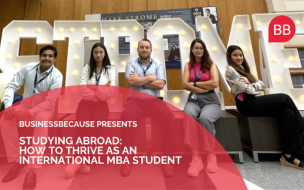The Co-President of the Asia Business Club gives tips on working successfully in Asia and we find out about a recent visit from the CEO of Samsung Card.
What is the main aim of your club?
The Asia Business Club focuses on providing Harvard Business School students with a channel to share their experience and interest in Asia. We create opportunities to network and to explore career opportunities, developing long-term relationships among our members and alumni. We hold a widely attended annual conference that allows speakers from Asia to interact with HBS students and students from other schools. Obviously we also like to have fun; we organize plenty of activities for members to interact in a social setting.
Why did you decide to do an MBA?
From a professional standpoint, we recognized the many skills and experience in functional areas that we were missing to have a long-term career in business. The network that one naturally develops within the MBA class is also extremely valuable -- it is said that the 90 students in each section at HBS grow so close that you can call any of them up years after graduation. From a personal standpoint, we feel that we have truly matured and learned more about ourselves at HBS through our classes and activities (including the opportunity to start a small business and give regular feedback to others).
Who was the most exciting speaker you had this year?
The President and CEO of Samsung Card came to speak to us in a small-group setting, providing advice to us on how to best make use of our multicultural background and how to develop a career in Asia. He also shed some light on recent developments and the history of Samsung. With such an interesting background, he was a personable and engaging speaker.
Is it useful to regard Asia as one entity?
In our opinion, there are two sides of the coin. On the one hand, Asia as an entity has gained significance in the recent decade in terms of economic, social and political growth. This is a shared goal that we are proud of. On the other hand, Asia encompasses within it many distinct cultures and history that people should acknowledge. Recognizing that an upbringing in Malaysia differs from that in Singapore, or even that cultural experiences within China can differ by province, is essential to successfully working in Asia.
Is knowledge of the Chinese language essential for developing businesses in China?
No, we certainly have members who do not speak Chinese but who are very interested in developing a career in China. Chinese is a very useful language but more important is an understanding and respect of the culture and social dynamics.
RECAPTHA :
88
26
e7
25







